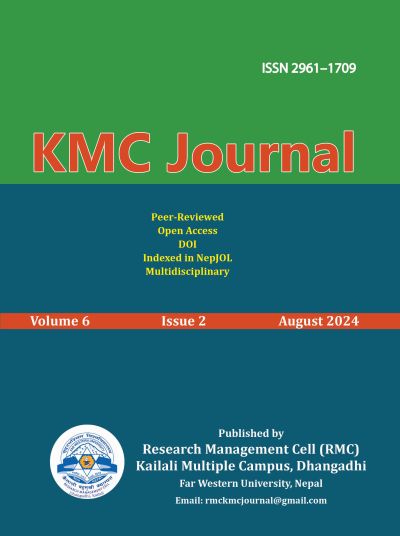In silico Molecular Docking and Dynamic Study of MDM2-p53 Inhibitor Alkaloids Extracted from Withania somnifera Against Tumor Growth
DOI:
https://doi.org/10.3126/kmcj.v6i2.68906Keywords:
Withania somnifera, alkaloids, tumor, drug designAbstract
In today’s world, human tumor growth has become a critical health issue. Many patients experience ineffective chemotherapeutic treatments, prompting the need for alternative methods. Our recent research has explored active alkaloid extracts from Withania somnifera as potential inhibitors of the MDM2-p53 interaction, a key factor in tumor growth. Using in silico molecular docking and dynamic approaches, we identified eight effective alkaloids with high docking score are WithanolideD (–10.0Kcal/mol), Withanolide (–10.0Kcal/mol), WithaferinA ( ̶ 9.9Kcal/mol), WithanolideB ( ̶ 9.5Kcal/mol), WithalongolideA ( –9.4Kcal/mol), WithanolideE ( ̶ 9.4Kcal/mol), WithanolideA ( ̶ 9.0Kcal/mol), Withanone ( ̶ 8.9Kcal/mol). Among them, WithaferinA, WithanolideA, WithanolideD, WithanolideE, and Withanone demonstrated the most stable hydrogen bonding, stable RMSD, and RMSF. Lipinski’s rule of five, which assesses drug-like qualities, confirmed their potential through canonical SMILES verification. Molecular dynamics of the protein-ligand complex revealed that these docked complexes remain thermally stable, with consistent bond energy, dihedral angles, and stereochemical conformation over a 100 ns time frame. Our findings suggest that these alkaloids from Withania somnifera hold promise as effective treatments against tumor growth. Further investigation and exploration are necessary to confirm their efficacy in clinical settings.
Downloads
Downloads
Published
How to Cite
Issue
Section
License

This work is licensed under a Creative Commons Attribution-NonCommercial 4.0 International License.
This license allows reusers to distribute, remix, adapt, and build upon the material in any medium or format for noncommercial purposes only, and only so long as attribution is given to the creator.




